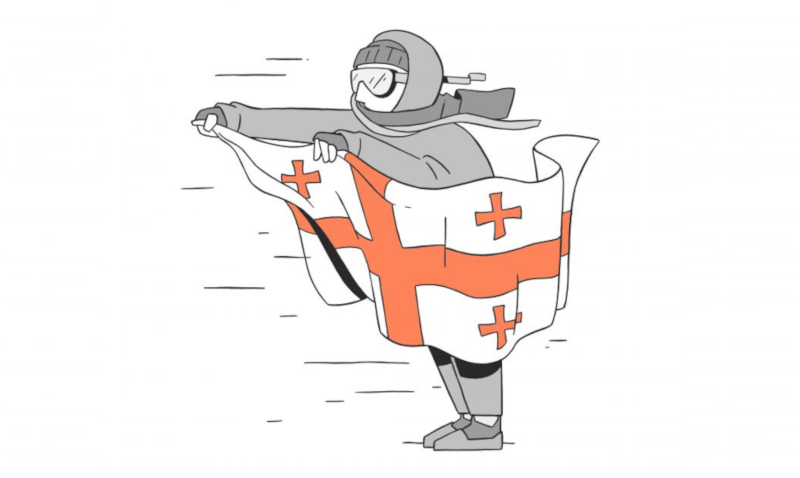Georgians have been demonstrating on and off since spring against the ruling Georgian Dream party and its pro-Russian and growing authoritarian stance. But the latest wave of protests, which began at the end of November, feels different. The intensity on the streets is unprecedented.
The protesters are angry, and their anger is deepening in the face of an increasingly heavy-handed response from the authorities. The cause remains the same, but now the growing sense of betrayal is too obvious to deny, even for some of the ruling party voters who bought into the Georgian Dream's pre-election promise of a European future.
The catalyst was a statement by Prime Minister Irakli Kobakhidze on 28 November. In the country where the goal of European Union integration is enshrined in the constitution and public support for this goal has consistently polled at around 80%, Kobakhidze declared that the government will suspend EU integration talks until 2028. Soon after the briefing, Moscow chimed in with praise, as Vladimir Putin lauded the Georgian government’s “bravery”.
For much of Georgian society, EU integration means more than economic stability or open borders – it is a struggle for survival. Many see the EU as a shield against Russia, the historical oppressor that has long loomed over the nation. The current protests therefore represent the continuation of a centuries-long struggle to escape the grip of Russian colonialism, a struggle for which Georgians have repeatedly paid in blood.
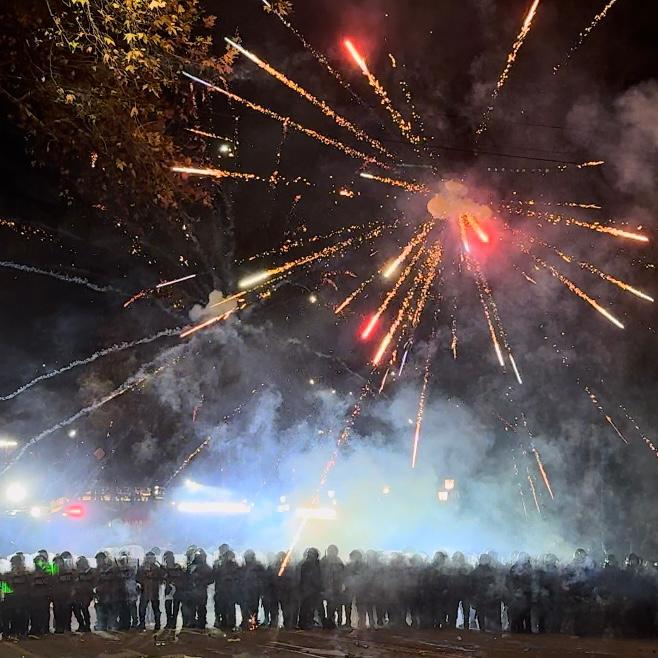
In this context, protests seemed inevitable after Kobakhidze's announcement. But as I walked to the parliament building that evening, my expectations were modest. You see, the November protests over the disputed elections had lost momentum, people had been overtaken by a sense of exhaustion and defeat. So it seemed that the government had timed its announcement well, exploiting public despair to consolidate its pro-Russian agenda. But what I saw that evening took me completely by surprise.
Within an hour of the speech, the streets around the parliament were teeming with people. No opposition party or activist organisation had called for the protests. It was a spontaneous and uncoordinated outpouring of public anger. There were no stages or loudspeakers, just people booing and banging on steel barricades. Suddenly a voice began to chant "Re-vo-lu-tion" and others joined in. It was then that it became clear that the ruling Georgian Dream party had miscalculated. It was also clear that their response would be brutal.
Six rounds of beating
That night, police used tear gas, pepper spray and water cannons. Dozens of demonstrators were beaten and arrested. Now, almost three weeks later, the protests have spread far beyond Tbilisi to cities, towns and even small villages across the country. High-profile resignations have followed: the deputy foreign minister, six Georgian ambassadors and scores of civil servants have quit in protest. Journalists are leaving pro-government media and hundreds of civil servants have publicly condemned the government's halt to EU integration. The government has already threatened to punish those who signed the declarations.
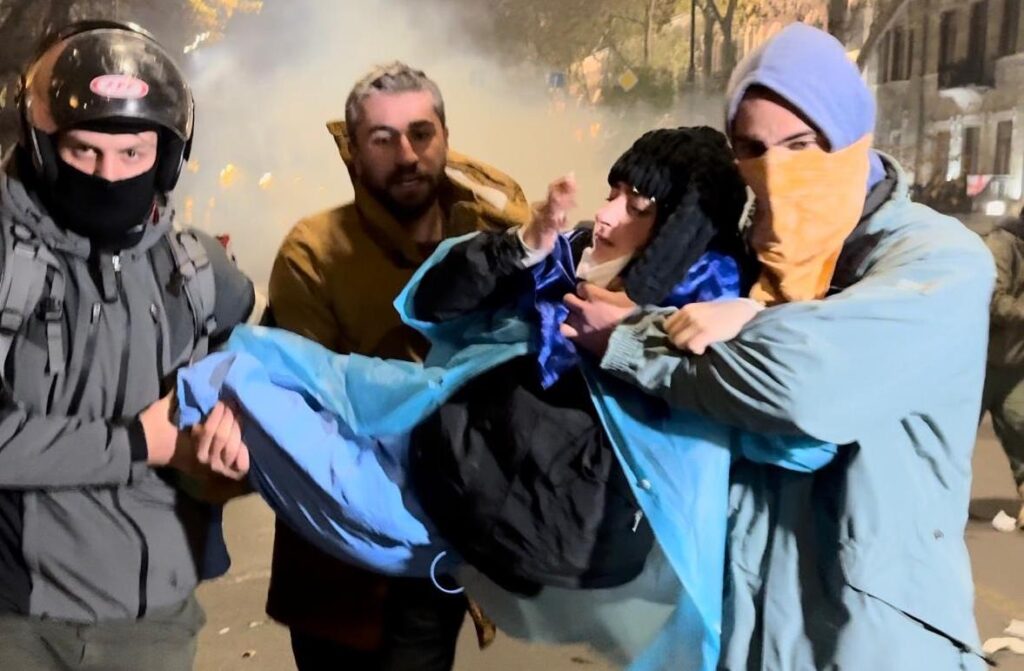
Now, a few weeks later, it has become routine for protesters to turn up outside parliament every evening. During the day, protesters paralyse the streets of Tbilisi with marches and walkouts. Dozens of industries and communities are coming together to cause disruption and spread their message. We have seen marches organised by lawyers, doctors, IT specialists, winemakers, grandparents and animal lovers taking over the streets. The best so far was a march organised by Real Madrid and FC Barcelona fans, who declared a truce to protest together. For Georgians, who use and abuse humour to cope with difficult situations, it has almost become a joke - who can come up with the funniest title for a march?
But as the protests have escalated, so has the government's crackdown. More than 460 protesters, opposition figures, activists and journalists have been arrested, and more than 300 have been brutally beaten. Arrests aren't limited to protests – police have raided homes and arrested activists on the spot. Journalists have been particularly targeted, with at least 90 arrested, beaten or obstructed in their work. Several of them have had to undergo serious medical treatment, including Guram Rogava, a reporter for the local TV channel Formula, who was hospitalised with broken bones in his face and neck after being assaulted by a member of the special forces.
This generation – my generation – knows the fragile benefits of democracy. For them, surrender is not an option
A source in the Interior Ministry told me on condition of anonymity that detention centres are running out of space. Cells in Tbilisi and surrounding towns are so overcrowded that police are transferring detainees to facilities in Kutaisi, a four-hour drive west of the capital.
"After my arrest, I was passed around to different groups of special forces to be beaten, but carefully enough to keep me alive," Lazare Maglakelidze, a 20-year-old student, told me. Arrested on 3 December, Lazare lost consciousness after the first round of beatings, which were aimed at his head. He woke up inside a police van. A fellow detainee, who had watched the beating through the van’s window, later recounted the events to him: "He saw my unconscious body being held up by two special forces officers who were kicking me on the head with their boots, knees, fists – basically everything." In the van, Lazare said, the abuse continued. "We're going to rape you with police truncheons... You're faggots, that's what you like, eh?" the officers shouted as the prisoners' blood pooled on the floor of the van. That night, Lazare endured six rounds of beatings.
"This isn't improvisation or a spontaneous decision... This is how the system works," says Lazare. Dozens of testimonies confirm systematic brutality: detainees are passed between officers for beatings designed to maximise damage while avoiding death. These acts take place out of public view, in vans with tinted windows.
Lazare is currently recovering from his nose operation and concussion, and is eager to return to the protests. But first there's his trial, and he has no hope of finding justice within the walls of the Tbilisi City Court. The trials can only be described as a sham. When I attended my friend's trial last week, I chatted with a group of lawyers. “We're just a decoration in these courtrooms,' one of them told me, 'most of the judges won't even bother to look at the evidence we present.”
Oligarch Bidzina Ivanishvili’s Georgian Dream has long had a stranglehold on Georgia's judiciary. Four Georgian judges have been sanctioned by the US government for corruption and most of the judges are believed to be involved in similar corruption schemes. The groundwork for authoritarian rule was laid long ago, but now, with Georgian Dream's fourth term in office and the critical situation on the streets, all the resources are being activated.
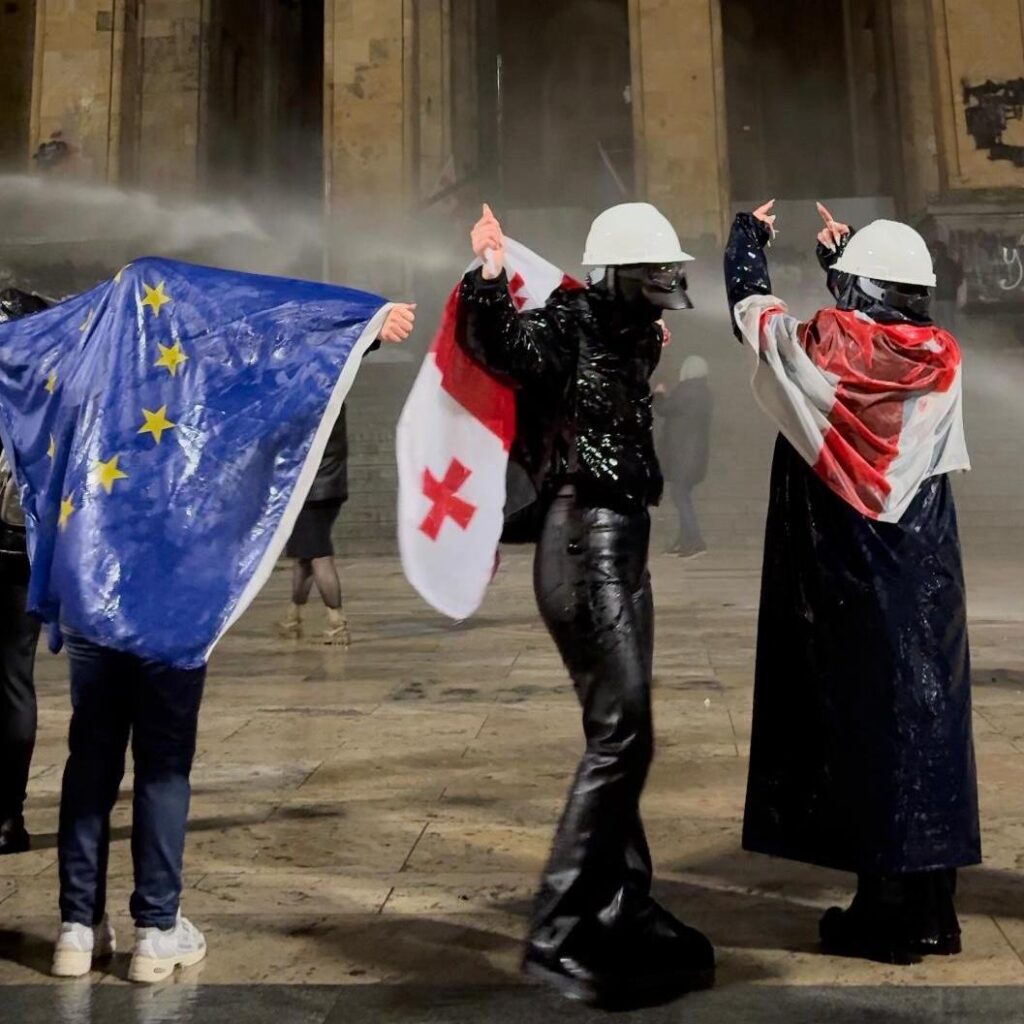
Euromaidan, the Georgian way?
The government and its propaganda machine have tried to portray the protests as Georgia's Euromaidan, referring to Ukraine's 2013-2014 uprising against President Viktor Yanukovych's decision to halt EU integration. Yanukovych was ousted, but the propaganda in Georgia focuses on the destruction, loss of life and subsequent Russian invasion that followed the Ukrainian revolution.
Given the very different context in Georgia and Russia's current foreign policy failures, these similarities are questionable, but what is uncanny are the parallels between Yanukovych's authoritarian crackdown on protesters and the Georgian government's almost comically identical moves.
Georgia's version of Ukraine's "titushki" – government-sponsored thugs – have already appeared on the streets of Tbilisi. Over the weekend of 7-8 December, masked individuals attacked journalists, opposition leaders and demonstrators while police stood by. A reporter was strangled during a live broadcast; her cameraman was kicked and trampled. Meanwhile, the government has introduced measures to stifle protests, including bans on fireworks, gas masks and even simple face coverings – tools protesters use for self-defence.
Losing Georgia would mean more than the loss of a strategic ally – it would mark another victory for Russia against liberal democracy
Fines for graffiti have jumped from GEL 50 (about €17) to GEL 1,000 (about €338), and new penalties for taking part in road blockades are severe: GEL 5,000 (about €1,693) if the police decide the crowd is too small, with the most active protesters facing fines of up to GEL 15,000 (about €5,000). Judges now have the power to impose up to 15 days' imprisonment instead of fines, further intensifying the crackdown. Police powers have also been dramatically extended. Under the guise of 'preventive detention', people with previous criminal or administrative offences can now be detained for 48 hours on the mere suspicion that they might commit a crime. Recruitment to the police force has also been simplified, with competitive hiring processes eliminated, signalling a potential increase in the number of officers used to quell protests.
Despite these measures, the protests go on. But the challenges ahead are immense. Protesters face not only an authoritarian regime, Russian propaganda, and pro-Russian forces within the West, but also the freezing cold – temperatures rarely are above 5°C in the evening these days. After 12 years of Georgian Dream's efforts to weaken civil society, the opposition is fragmented, with many politicians out of touch with the realities on the ground.
This vacuum has forced ordinary citizens to take charge of the movement. The only unifying leader on the stage is President Salomé Zourabichvili, a former ally of Georgian Dream who has since broken ties with the party that brought her into politics. She now acts as a messenger to the West, appealing for crucial international support for pro-EU protesters and greater pressure on the government.
I believe the West must heed these pleas. Losing Georgia would mean more than the loss of a strategic ally – it would mark another victory for Russia against liberal democracy.
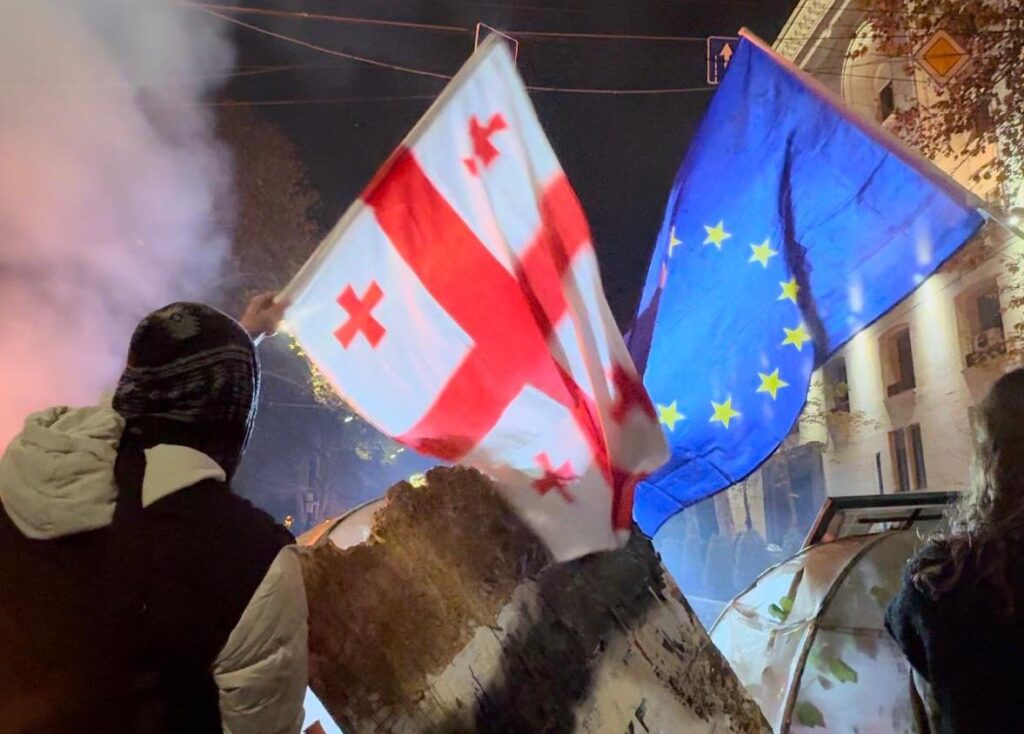
International backing is critical, but even without guarantees of Western involvement, protesters remain resolute. From all walks of life, they continue to fill the streets. While the role of young Georgians is particularly prominent, their determination reflects a broader societal resolve. Having grown up in an independent Georgia, this generation – my generation – knows the fragile benefits of democracy. For them, surrender is not an option.
The government has set out its vision for Georgia, but so have its citizens who took the streets. Their courage is keeping the hope alive: that determination and solidarity – much like Ukraine’s during the Maidan protests – can turn the tide.
🤝 This article is published within the Come Together collaborative project.
Do you like our work?
Help multilingual European journalism to thrive, without ads or paywalls. Your one-off or regular support will keep our newsroom independent. Thank you!













